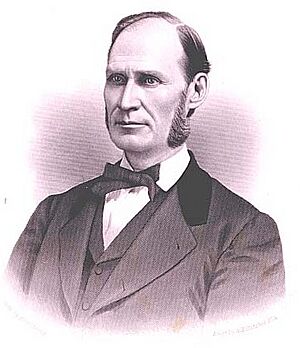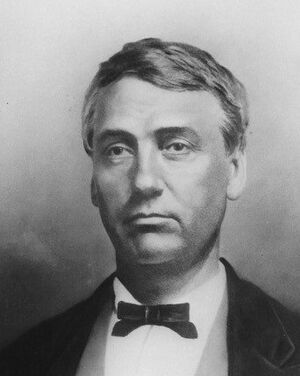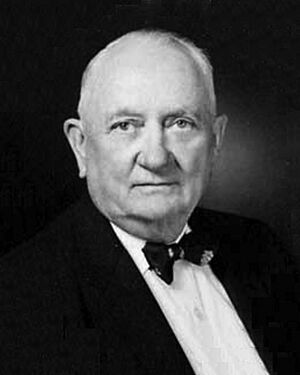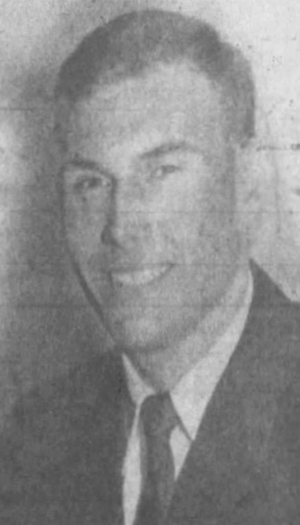Tennessee Secretary of State facts for kids
Quick facts for kids Secretary of State of Tennessee |
|
|---|---|

Flag of the State of Tennessee
|
|

Great Seal of the State of Tennessee
|
|
| Department of State | |
| Appointer | Tennessee General Assembly |
| Term length | Four years |
| Constituting instrument | Tennessee State Constitution |
| Formation | 1792 |
| First holder | Daniel Smith |
| Website | Tennessee Secretary of State website |
The Tennessee Secretary of State is an important job created by the Tennessee State Constitution. This person helps manage many important parts of the state government in Tennessee. The person holding this job right now is Tre Hargett.
Contents
How the Secretary of State Is Chosen
According to Tennessee's Constitution from 1870, the Secretary of State is chosen for a four-year term. This choice is made by the General Assembly in a special meeting called a joint convention.
What Is a Joint Convention?
A joint convention means that all 99 state Representatives and 33 state Senators meet together. They act as one group and each person casts a single vote. To win the election, a candidate needs at least 67 votes out of the total 132.
Since this job is chosen based on political parties, the party with the most members in both parts of the General Assembly will pick their candidate. For a long time after the Civil War, the Secretary of State was always a Democrat. But in 2009, the Republicans gained more seats and have chosen the Secretary of State since then.
Term Length and Comparison to Other States
The Secretary of State's term usually starts and ends around the same time as the President of the United States's term. This is different from the governor of Tennessee's election cycle.
Tennessee's way of choosing its Secretary of State is quite unique. In most other U.S. states, the Secretary of State is either voted for by the public or picked by the state's governor. Also, in Tennessee, the Secretary of State is not next in line to become governor if something happens to the current governor. The speakers of the Senate and House are first in line.
The Secretary of State is one of only three "constitutional officers" in Tennessee, besides the governor. Most other states have more. The other two officers, the State Treasurer and the Comptroller of the Treasury, are chosen for two-year terms. There are no limits on how many terms a person can serve in any of these jobs. The office led by the Secretary of State is called the "Tennessee Department of State."
What the Secretary of State Does
Because the state legislature chooses the Secretary of State, this office is considered part of the legislative branch of government in Tennessee, not the executive branch.
Key Responsibilities
The Secretary of State's office has many important duties, including:
- Helping new corporations get started.
- Registering trademarks and service marks for businesses.
- Managing elections across the state.
- Publishing the Tennessee Blue Book every two years. This book is an official guide to all parts of the Tennessee State Government.
- Publishing other state documents, including all new laws passed by the General Assembly.
- Overseeing charitable groups and their fundraising.
- Managing the state library and archives.
- Running the state's Economic Commission on Women.
To handle these tasks, the Tennessee Department of State has several administrative law judges. The Secretary of State earns a yearly salary of $222,252, which is one of the highest for this position in the country.
History of the Office
Some historians believe that during the American Civil War, Edward H. East, who was Secretary of State, became governor. This happened when Andrew Johnson, who was the military governor, became Vice President of the United States in 1865. East supposedly served as governor until William "Parson" Brownlow took office. However, the official Tennessee Blue Book does not list East as a governor.
Joe C. Carr served as Secretary of State three times, for a total of 27 years. This makes him the longest-serving Secretary of State. His wife even held the office while he was serving in the military during World War II.
Important Court Case
As the Secretary of State, Joe C. Carr was in charge of elections. Because of this, his name was part of a famous 1962 Supreme Court case called Baker v. Carr. In this case, the Supreme Court decided that voting districts for the U.S. House and state legislatures must have roughly equal populations. This was to make sure everyone's vote counted equally, following the "equal protection" rule of the Fourteenth Amendment to the United States Constitution. This idea is often called "one person, one vote."
Changes to Bingo Laws
In the 1970s and 1980s, the Secretary of State's office was given the job of giving out licenses for bingo games. Some problems with these licenses led to issues and changes in the office. As a result, bingo became illegal in Tennessee for a time. It is still mostly illegal, but since 2014, it has been allowed as a yearly fundraising event for certain war veteran organizations.
The current Secretary of State, Tre Hargett, has been in office since January 2009. Before this, he was a leader for the minority party in the Tennessee House of Representatives.
Past Secretaries of State
Here is a list of people who have held the job of Secretary of State in Tennessee:
| Image | Name | Term |
|---|---|---|
| Daniel Smith (Territorial Secretary of Territory South of the River Ohio) |
1792–1796 | |
| William Maclin | 1796–1807 | |
| Robert Houston | 1807–1811 | |
| William Grainger Blount | 1811–1815 | |
| William Alexander | 1815–1818 | |
| Daniel Graham | 1818–1830 | |
| Thomas H. Fletcher | 1830–1832 | |
| Samuel G. Smith | 1832–1835 | |
| Luke Lea | 1835–1839 | |
| John S. Young | 1839–1847 | |
| W .B. A. Ramsey | 1847–1855 | |
| F. N. W. Burton | 1855–1859 | |
| J. E. R. Ray | 1859–1862 | |
| Edward H. East (appointed by Andrew Johnson, Military Governor of Tennessee) |
1862–1865 | |
| A. J. Fletcher | 1865–1870 | |
| T. H. Butler | 1870–1873 | |
| Charles N. Gibbs | 1873–1881 | |
| David A. Nunn | 1881–1885 | |
| John Allison | 1885–1889 | |
| Charles A. Miller | 1889–1893 | |
| William S. Morgan | 1893–1901 | |
| John W. Morton | 1901–1909 | |
| Hallum W. Goodloe | 1909–1913 | |
| R. R. Sneed | 1913–1917 | |
| Ike B. Stevens | 1917–1921 | |
| Ernest N. Hasten | 1921–1937 | |
| Ambrose B. Broadbent | 1937–1941 | |
| Joe C. Carr | 1941–1944 | |
| Mary Hart Carr (Mrs. Joe C. Carr) | 1944–1945 | |
| Joe C. Carr | 1945–1949 | |
| James H. Cummings | 1949–1953 | |
| George Edward Friar | 1953–1957 | |
| Joe C. Carr | 1957–1977 | |
| Gentry Crowell | 1977–1989 | |
| Milton P. Rice | 1989–1990 | |
| Bryant Millsaps | 1990–1993 | |
| Riley Darnell | 1993–2009 | |
| Tre Hargett | 2009–present |
See Also
 | Audre Lorde |
 | John Berry Meachum |
 | Ferdinand Lee Barnett |






